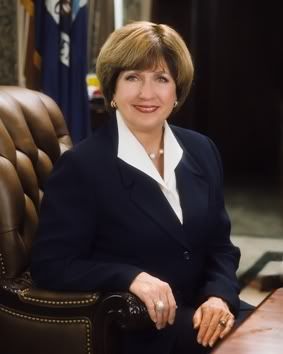Blanco speaks on Katrina's lessons at UNC
 Former Louisiana Gov. Kathleen Blanco is on the lecture circuit these days talking about lessons learned from Hurricane Katrina. She gave her first speech as a former governor outside her home state last month at the University of Arkansas Clinton School of Public Service, and last night she delivered the annual Charleston Area Alumni Lecture in Southern Affairs at the University of North Carolina at Chapel Hill.
Former Louisiana Gov. Kathleen Blanco is on the lecture circuit these days talking about lessons learned from Hurricane Katrina. She gave her first speech as a former governor outside her home state last month at the University of Arkansas Clinton School of Public Service, and last night she delivered the annual Charleston Area Alumni Lecture in Southern Affairs at the University of North Carolina at Chapel Hill.
Blanco, a Democrat, chose not to run for re-election and left office in January. She was succeeded by Republican Bobby Jindal, who she had defeated four years earlier. She described leaving as a "blessed ending" and said she "can't stop smiling from ear to ear" to have her life back.
Noting that any community can be turned upside down in an instant, she emphasized that emergency planning must not be an afterthought. Blanco offered four key things Katrina taught her:
1. "You cannot coordinate if you cannot communicate," she said.
Blanco recounted the complete collapse of Louisiana's communications infrastructure in the wake of the storm, as winds knocked over cell phone towers and floodwaters inundated BellSouth's facilities. She told of National Guard officers being forced to deliver important messages by bicycle.
"Communities should invest in communications systems that can withstand hell or high water," she said.
2. "Be prepared to be on your own for the first 72 hours after a disaster," she advised.
Blanco pointed to the federal government's well-documented failure to respond to the Katrina disaster in a timely way, with the Bush administration not dispatching the Army to Louisiana until five days after the storm. She thanked North Carolina for promptly sending National Guard troops -- and for taking in some 6,000 displaced persons.
3. "You cannot meet unlimited needs with limited resources," she observed, urging the formation of compacts between states to help each other in the event of a major disaster.
Blanco pointed to other instances where greater coordination and planning was needed. For example, nursing homes that arranged for buses to rescue residents sometimes ended up contracting for the same buses. Commercial airlines concerned about the cost of flying into New Orleans with empty planes canceled flights, which meant that tourists had to be evacuated under duress. And the Army Corps of Engineers based its plan for distributing commodities on the assumption that people would be able to drive to pick them up -- even though many of those who stayed behind didn't have cars or lost them in the flood.
4. "When systems go down, paranoia sets in, and the media cycle spins out of control," she warned.
Blanco noted that news outlets reported horrific stories of violence in the storm's aftermath that were later found to be exaggerated or wholly inaccurate. She pointed to the problems that can arise when hordes of reporters descend on a disaster area, calling it "unconscionable" to give reporters space on rescue boats or helicopters when people still need to be saved.
The former governor had strong criticism for the Bush administration, which she blasted not only for failing to promptly help the storm's victims but also for trying to shift the blame for its failed response to state officials. That in turn threatened to create other problems, as Blanco's staff got sidetracked trying to correct the record.
"I ordered my staff to quit trying to defend me against the game of gotcha," she said.
In closing, Blanco had effusive praise for the response of the American people, and for the numerous organizations and individuals that have come to the Gulf Coast and turned New Orleans into a laboratory for public service.
"Ten years from now, Louisiana will surpass our dreams," she predicted. "Its robust economy will be a source of pride for the South."
Following the hour-long talk, Blanco answered questions for about half an hour, addressing the rebuilding of the levees, the misinformation spread about the actions she took in advance of the storm, her controversial shoot-to-kill order (which she said came only to quell the fear of violence that was paralyzing rescue efforts), and the urgent need to reform the federal Stafford Act governing disaster response.
In the final question of the night, she was asked whether she has any plans to re-enter politics.
"I'm planning to write my book to tell my story," she said to enthusiastic applause.
Tags
Sue Sturgis
Sue is the former editorial director of Facing South and the Institute for Southern Studies.
